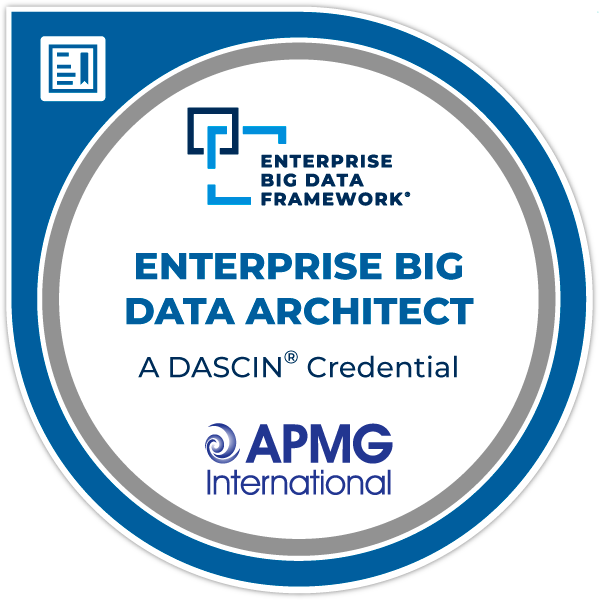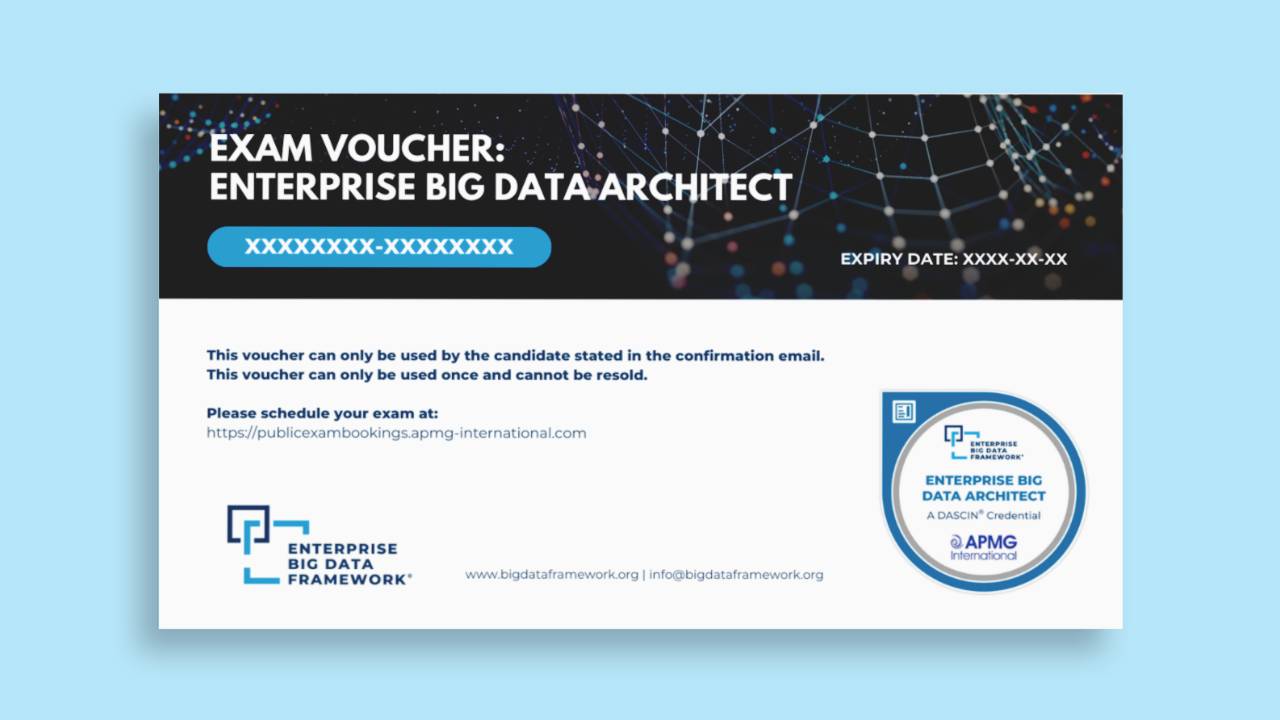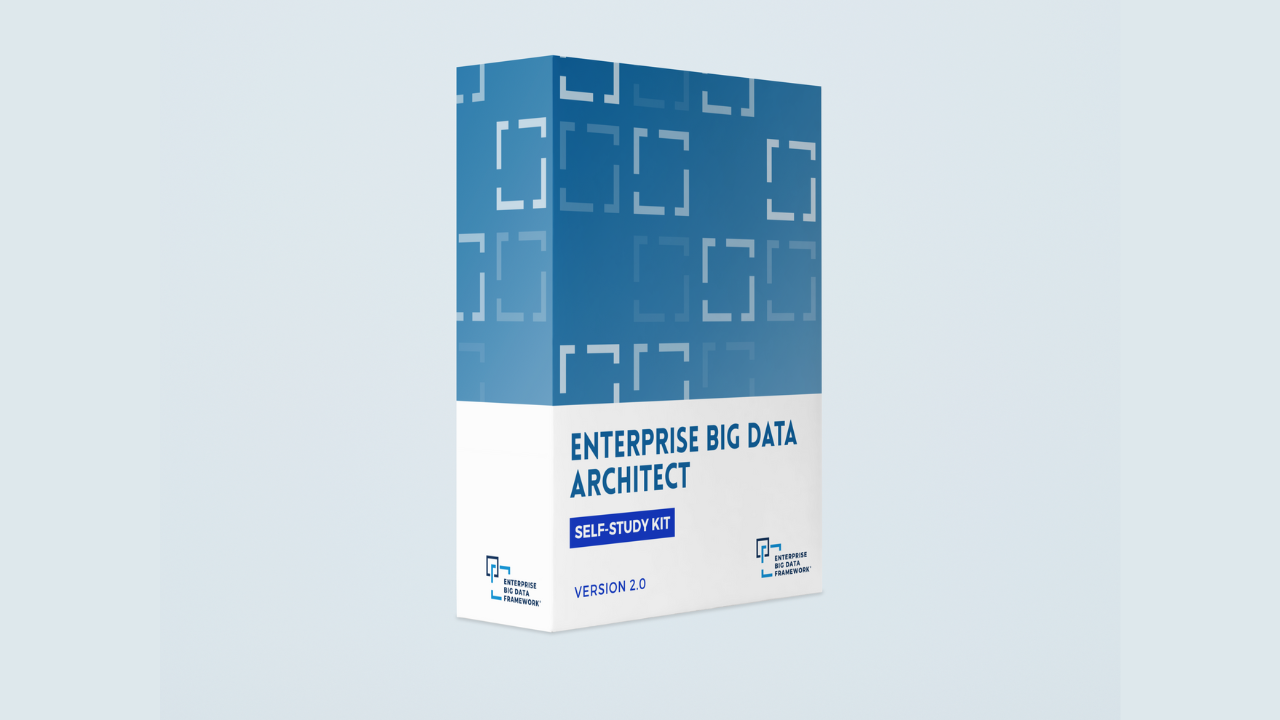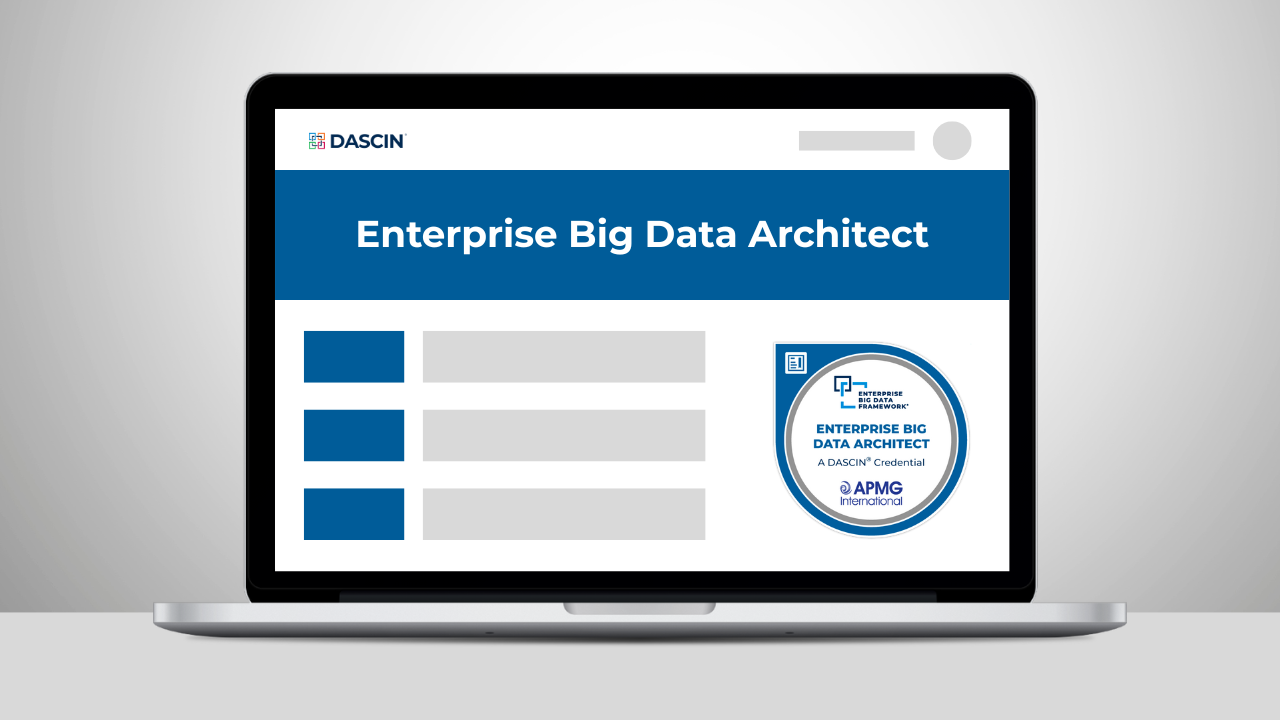Course Summary
The Enterprise Big Data Architect (EBDAR) Training is designed for professionals looking to build expertise in the strategic design and implementation of large-scale big data solutions. This comprehensive course covers the core principles, methodologies, and technologies involved in architecting and deploying big data platforms in enterprise environments. Participants will learn about data architectures, cloud integration, data governance, and key design considerations for scalable and flexible systems that can handle massive volumes of data. By the end of the course, participants will gain a solid understanding of how to plan, implement, and optimize big data infrastructures to drive business success.
Through a combination of theoretical concepts and hands-on exercises, this training prepares students to address real-world challenges such as ensuring data quality, scalability, and high availability. The course delves into advanced tools and frameworks used by data architects, including Apache Hadoop, Apache Spark, and NoSQL databases, among others. Learners will also explore how to integrate emerging technologies, such as AI and machine learning, into big data solutions to enhance analytics capabilities and business decision-making. Key considerations for security, privacy, and compliance are also covered to ensure that data architectures meet regulatory requirements and organizational needs.
Ultimately, this course equips participants with the skills to design end-to-end big data architectures tailored to the specific needs of their organization. Whether aiming to build new big data solutions or optimize existing systems, students will walk away with a comprehensive understanding of the architectural patterns, tools, and best practices necessary for creating innovative and effective big data environments. Upon completion, participants will be well-positioned to step into roles as Enterprise Big Data Architects or contribute at a strategic level within their organizations to drive data-driven transformation.
detailed course Information
The Enterprise Big Data Architect Training equips participants with the advanced knowledge, strategic insights, and practical skills necessary to design and implement scalable big data solutions. Upon completion, participants will be able to:
- Explain the foundational principles of big data architecture, including key architectural frameworks such as the lambda and kappa architectures, and understand their applications in modern enterprise environments.
- Describe the core technologies and tools used in big data systems, such as distributed file systems, data lakes, and processing frameworks like Apache Hadoop and Apache Spark.
- Design and implement scalable big data architectures, considering factors such as data volume, velocity, variety, and veracity, while ensuring optimal performance and adaptability to business needs.
- Understand and apply the NIST Big Data Reference Architecture (NBDRA) to structure and guide the design of big data systems, ensuring alignment with industry best practices and standards for interoperability and scalability.
- Integrate cloud-based solutions into big data environments, leveraging platforms like AWS, Azure, and Google Cloud for enhanced scalability, flexibility, and cost-effectiveness.
- Apply best practices in data governance, security, and compliance, ensuring the protection of sensitive data and adherence to global regulatory standards in enterprise-grade systems.
- Analyze and evaluate big data architectures based on specific business requirements, providing strategic recommendations for optimizing system performance and scalability.
- Collaborate with data engineers, scientists, and business leaders, ensuring alignment between big data solutions and organizational goals to maximize the value of data-driven initiatives.
These objectives provide learners with the comprehensive knowledge and skills required to excel as Enterprise Big Data Architects, empowering them to design future-ready big data solutions that drive business transformation and innovation.
The Enterprise Big Data Architect Training is designed to provide participants with the expertise and skills required to design, implement, and optimize big data solutions in enterprise environments. The program is divided into four main modules, each covering critical aspects of big data architecture. Delivered over 30 hours of instructor-led training, this course ensures participants gain both theoretical knowledge and practical experience to succeed in architecting big data systems.
Module 1: Foundational Principles of Big Data Architecture (FPBDA)
- Big Data Fundamentals: Understand the core concepts of big data, including the 4Vs (Volume, Velocity, Variety, and Veracity) and their implications for architecture design.
- Architectural Frameworks: Explore foundational frameworks such as lambda and kappa architectures, understanding their use cases, benefits, and limitations in handling streaming and batch data.
- NIST Big Data Reference Architecture (NBDRA): Gain insights into the NIST Big Data Reference Architecture, its components, and how it serves as a blueprint for designing interoperable and scalable big data systems.
- Introduction to Key Technologies: Familiarize yourself with the essential tools and technologies used in big data environments, such as distributed file systems, data lakes, and processing frameworks like Apache Hadoop and Spark.
Module 2: Designing Scalable Big Data Architectures (DSBDA)
- Data Pipeline Design: Learn how to design efficient data pipelines to ensure seamless data ingestion, processing, and movement while maintaining scalability and performance.
- Real-Time and Batch Processing: Understand the principles of ETL, real-time stream processing, and batch processing to integrate and analyze data effectively.
- Cloud Integration: Explore how to integrate cloud platforms (AWS, Azure, Google Cloud) into big data environments for scalable and cost-effective architecture solutions.
- Big Data Storage Solutions: Dive into the design and optimization of storage solutions for structured and unstructured data, leveraging technologies like HDFS and NoSQL databases.
Module 3: Data Governance, Security, and Compliance (DGSC)
- Data Governance: Learn how to implement robust governance frameworks to ensure data quality, consistency, and availability across enterprise systems.
- Security in Big Data Architectures: Understand best practices for securing big data environments, including encryption, access control, and monitoring mechanisms.
- Compliance Standards: Gain knowledge of regulatory requirements such as GDPR, HIPAA, and CCPA, ensuring your big data solutions adhere to global compliance standards.
- Ethical Considerations: Explore the ethical implications of big data, focusing on privacy concerns, bias mitigation, and responsible data practices.
Module 4: Applied Big Data Architectures in Enterprise Contexts (ABDCE)
- Business-Driven Design: Analyze and evaluate big data architectures based on specific business needs and objectives, ensuring alignment with organizational goals.
- Real-World Use Cases: Apply architectural principles to solve challenges in industries such as finance, healthcare, and retail, including predictive analytics, fraud detection, and customer segmentation.
- Collaboration Across Roles: Develop skills to work effectively with data engineers, scientists, and business leaders to create comprehensive and value-driven big data solutions.
- Emerging Trends: Stay updated on the latest trends in big data, such as edge computing, AI-driven architectures, and advancements in distributed systems.
This structured curriculum ensures participants gain a comprehensive understanding of the key elements of big data architecture, enabling them to design scalable, secure, and business-aligned solutions for enterprise environments. Each module is designed to build practical expertise, preparing participants to excel as Enterprise Big Data Architects.
The target audience for the Enterprise Big Data Architect (EBDAR®) qualification includes a wide range of professionals seeking to master the design, implementation, and optimization of big data architectures in enterprise environments. This includes:
- Big Data Architects: Professionals responsible for designing scalable and efficient big data systems who want to deepen their knowledge of advanced architectural principles, tools, and frameworks.
- Data Engineers: Individuals focused on building and managing data pipelines and infrastructure, seeking to enhance their understanding of architecture design and integration with cloud platforms and emerging technologies.
- IT Architects: IT professionals who design enterprise systems and solutions, looking to specialize in big data environments to address the growing demand for scalable and high-performing architectures.
- Data Governance and Security Professionals: Experts tasked with ensuring data quality, governance, and security, aiming to understand how these elements integrate into big data architectures.
- Cloud Architects: Professionals managing cloud-based systems who want to expand their knowledge of integrating big data solutions within cloud environments to ensure scalability, cost-effectiveness, and compliance.
- Business Analysts and Decision-Makers: Individuals who collaborate with technical teams to implement data-driven solutions, seeking to understand the technical aspects of big data architectures to align them with organizational objectives.
The EBDAR qualification is designed for a diverse audience, including technical professionals, managers, and strategists, equipping them with the knowledge and skills necessary to design robust, scalable, and secure big data solutions that drive enterprise success.
The Enterprise Big Data Architect (EBDAR®) exam is a comprehensive evaluation of candidates’ understanding of advanced data architecture concepts and their ability to apply these concepts in real-world scenarios. Key details of the exam include:
- Exam Format: Open-book exam with 80 multiple-choice questions, divided into 4 segments.
- Passing Criteria:
- Standard pass mark: 65% (52 correct answers).
- Trainer pass mark: 75% (60 correct answers).
- Duration: 150 minutes; candidates taking the exam in a non-native language receive an additional 30 minutes (total 180 minutes).
- Question Types: The exam includes classic questions, negatively worded questions, and select-evaluate tasks that require candidates to assess and select the best options from provided statements.
- Bloom’s Levels: The questions test higher levels of thinking, including analysis (Level 3), synthesis (Level 4), and evaluation (Level 5).
- No Negative Marking: Incorrect or unanswered questions do not incur penalties.
Candidates are encouraged to prepare using the Enterprise Big Data Architect Guide to ensure a solid understanding of the theoretical and practical aspects of data science. This preparation will help candidates effectively apply their knowledge to solve complex business problems and excel in the exam.
Digital Badge

Course Details
Testimonials & Course Reviews
The EBDAR program provided a well-rounded and comprehensive curriculum, focusing on both theoretical concepts and practical applications of big data architecture. The real-world examples and use cases helped me better understand how to tackle architectural challenges in enterprise environments. The module on cloud integration and the NIST Big Data Reference Architecture was particularly valuable for my role. Highly recommended for anyone in the industry!
I thoroughly enjoyed this course! It bridges the gap between traditional IT architecture and big data systems seamlessly. The focus on distributed systems like Apache Spark and Kafka was fantastic. The hands-on labs helped me apply the knowledge immediately in my projects. This course is a game-changer for anyone looking to transition into or enhance their big data architecture career.
The EBDAR course exceeded my expectations in every way. I particularly appreciated how it connected big data architecture with real business challenges, helping me design more scalable and cost-efficient solutions. The instructor was incredibly knowledgeable, and the content was up-to-date with current industry trends. I left with a much deeper understanding of how to design end-to-end big data systems.
The Big Data Architect program was a fantastic learning journey that enhanced my understanding of scalable data pipelines and architectural frameworks. The section on governance and security gave me the tools to ensure compliance while working with sensitive enterprise data. This course is ideal for anyone wanting to upskill and adapt to the ever-changing data landscape.
This course provides an good blend of technical knowledge and business application. As someone managing analytics projects at an enterprise scale, I gained valuable insights into how to align big data architecture with business needs. The focus on integrating cloud technologies was particularly useful. The EBDAR program is an excellent investment for professionals looking to make an impact.
Taking the EBDAR program was beneficial for my career. The modules on advanced data processing frameworks and architectural best practices have already improved how I approach big data projects for clients. The real-world case studies provided actionable insights, and the certification has boosted my credibility in the field. I wholeheartedly recommend this course to my peers in the industry.






